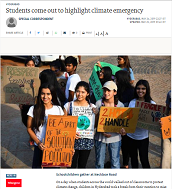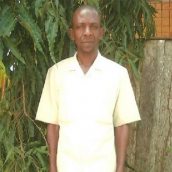Academy not in session - Thursday 6th - Friday 7th December 2018
School will remain closed on account of state assembly elections. Classes will resume on Monday 10th December.
Middle Years Programme exams: Monday 15th - Friday 19th April 2019
We wish our students in grades 6-9 all the best in their end-of-year assessments!
The year diversity defined our strength

Holiday on 12th Sep 2019 | Ganesh Immersion
Due to the likelihood of unusually heavy traffic and very congested roads, the Academy will be closed on the occasion of Ganesh Immersion.
International School Library Week - Monday 21st Oct - Friday 25th October
Celebrations kick-started in both Junior and Senior School libraries!
Diwali holiday - Monday 28th October
The Academy will be closed on account of Diwali. Wishing you all a very happy Diwali!
Middle Years Programme exams: Monday 18th - Wednesday 20th November
We wish our students in grades 6-10 all the best in their term exams!
Interview with Alison Hampshire, Head of Academy in Mombasa
Students Cinzia Torriani (year 10) and Alisha Doshi (DP1) interviewed Alison Hampshire, the new Head of Academy at the Aga Khan Academy Mombasa. They discussed passions, dreams, important themes in education and life lessons.
Hello Mrs Alison. Could you please share a brief background of yourself?
Hello girls! Of course! Well, I was born in Leeds, North of England, and I lived there until I was 17. I left home to attend the University of Sussex in Brighton, which is on the south coast of England. I studied for a music degree and was even a musician for a period of time! I then decided to train to be a teacher and started my teaching career in Brighton. After a little while, I got involved in theatre and became involved with a theatre group. I then ended up in Africa teaching, went back to England, ended up in Hong Kong, then Malaysia, and now back in Africa – Kenya more specifically.
If you were to describe yourself in a sentence, what would it be?
I think in a sentence I would describe myself as honest, passionate about education and protective. I am like a lioness and will protect the people that I am looking after, and that would include my students, my staff and my own family. My birth sign is actually a Leo, and my animal in the Chinese culture is a tiger, so I could see myself as a tiger and a lion – both loving yet protective animals.
Those are very important traits in a person. Similarly, what are the two things that you are not?
I know that I am not a mean person. I am not a very sporty person either!
Can you please tell us a little more about yourself and your family, for our readers to get to know you better? Is there something about yourself (a few interesting facts) that you would want students to know?
One of the things that perhaps people don’t know about me is that I really, really like heights, which is why I have done many activities that involve taking the risk of jumping out of an aeroplane, abseiling or even paragliding. I have done a number of things that require me to take a risk. And so, although I am sometimes hesitant, every time I have a birthday ending with 0, I like to give myself a new challenge and do something that is very difficult for me. There is nothing greater than accomplishing your goals.
The other thing is that I really like spicy food, so if I’m ordering a curry and the option is mild or hot, I would go for the hot one!
What is the most valuable life lesson you have ever learnt that you feel has had the biggest impact on you as a person?
One of my most valuable life lessons was when I was only 15. It was the first time that I ever felt that I had failed. When I was young, I played the flute and I received a distinction on every exam that I took, until I did my grade 6 (bronze level) exam where I got a merit. In the scheme of things, that’s not terrible, but it was devastating for me, and the life lesson I learned was that you have to pick yourself up, brush yourself off and try harder next time.
I was not prepared to proceed to grade 8 (gold level) until I was convinced that I was going to get a distinction, and so I worked and worked and worked and eventually that’s what happened. But the feeling I got when I was disappointed in myself was really hard, and the lesson I learnt was that sometimes you just have to forgive yourself and carry on.
What made you choose education as a profession? Is it a calling, a service, an agency or a love?
I started out as a musician and then realised that it wasn’t what I wanted to do with my life. It was selfish in a way – it was about being the best you could be, it was a very competitive environment. Also, while growing up at school, people had always said to me that I was such a good teacher. And so when the music didn’t work out as a profession, I looked to other options and tried many things out before deciding to be a teacher, but when I finally did decide to be a teacher I knew it was the thing I should have been doing from the beginning.
What values do you promote in terms of a learning environment?
I find that English literature provides all sorts of scenarios by which students can engage with issues and also aids in developing empathy. And I think that, as an English teacher, the important thing you need to develop is for students to be able to step inside another world and think about the lives of others.
And so the novels that I choose would possibly be about those that have challenging themes. I remember teaching To Kill A Mockingbird in a school which was entirely white, to help a rural British community understand the challenges of the themes in that novel. It was a very interesting experience. I also find that this is what literature can do – it can help us to see other people and other people’s worlds, and help us develop our understanding of different perspectives and ideally empathy for others.
I completely promote pluralism – it is also one of the main things literature can do. I remember having read the Chinua Achebe trilogy, and it was the beginning of my love for stories, literature and the love for Africa as well.
Why the Aga Khan Academy Mombasa?
Mostly because of the vision and the mission of His Highness. I completely believe that education is about empowering young people and that it is about change. I have always felt that I have gone into education to make a difference, not necessarily one that I can make but one that can be made through the lives of others through young people. And so, when I came across the mission and the vision of the Academy, it really seemed to synchronise with my own values. The other attraction was that having lived in Africa for my very first posting outside of Britain, the thought of returning was very exciting.
The community of students here is one that I felt was interesting to join. To be honest, in the past I have never worked in a situation where there were local teachers in an international school – it has mostly been expatriate teachers, and I found that to be a very exciting prospect.
What is something you have never done before and you may be able to do here in Mombasa?
I have never eaten a whole lobster! Actually, I would love to learn how to kite surf over the next few years. I would also really like to go and find some great African music and spend a whole night dancing!
What is your take on the students at the Academy, based on your interactions with them thus far? Do they measure up, in terms of mindset and potential, to those you have experienced in the west?
I think it is really hard to generalise a whole student body, especially with the regard to the fact that I have mostly taught in the east in Asia rather than in the west, but there is definitely a big difference between students in England and students I have taught in an international setting.
I have found that students here are really open and really social, very welcoming, and they seem quite interested in the adults in their lives. They are polite and also seem to be inquirers. My most intense experience was when I went on the DP1 trip, and I felt that the level of interaction the students had with each other showed great compassion with one another. They asked great questions, seeming to be very interested and open-minded, which are very good traits.
Is there a favourite quote or saying or aphorism – a thought that you live by, a statement that encapsulates your personal view?
There is a quote by Gandhi which I live by, and it encapsulates my personal view. It is basically about self-esteem and states that nobody else is in charge of your happiness, other than yourself. It is “Nobody can hurt me without my permission”. I think that how you react to a situation is in your control, and over time I have learnt that it is nobody else’s power to do anything to you; physically they can, but emotionally how I react is how I am – which is the lesson I have learnt.
Finally, is there anything else you’d like our readers to know about you?
The really important thing that I would want to let everyone know is that I am having a lot of fun so far, and I am really enjoying my time here, and I hope that carries on.
Participants of the AKA Outreach Programmes
Said Mwabeha: Sparking a Light in Students by Transforming School Leadership
Said Mwabeha became a teacher in 1990. He was drawn to the profession because it provided an opportunity to positively impact a range of people. “Almost everyone on earth,” he explains, “be it a president, be it a doctor, be it an engineer—all of them pass through a teacher. So, to me, a teacher is a very important person.”
Mwabeha aspires to spark a light in others through his teaching and says the Professional Development Centre at the Aga Khan Academy in Mombasa has enhanced his ability to do so. As the Head of Vuga Primary School in the coastal area of Kenya, Mwabeha attended a course focused on Leadership Management at the Academy.
“It really transformed me,” Mwabeha says of the course, which dealt with how Heads of School could make better use of their resources to enhance academic performance. While he previously undertook initiatives to improve the school as a “one-man shop”, he now takes an integrated approach to solving problems that involves a range of teachers, parents and students.
The Academy’s programme also spurred the creation of an association of teachers in Kwale County, where Vuga Primary is located, at the end of 2012. As Chair of Kwale Educational Leaders' Association, Mwabeha is leading teachers from 23 schools in formulating a strategic roster of activities to strengthen their academic performance. Their strategy is two-pronged. On the one hand, they plan to undertake workshops and other initiatives to improve pedagogy. On the other, they are organising awareness meetings and conferences for parents and teachers to discuss the importance of education. They hope to overcome the challenges and problems created by families that do not prioritise education.
Meanwhile, inside the classroom, Mwabeha is working hard to spark intellectual curiosity in his pupils. After receiving training in pedagogy at the Academy, he has promoted the use of more participatory teaching methods, both in his own classroom—where he teaches Social Studies and Religion courses to students in grades 4, 6 and 8—and in those of his colleagues. “It gives [the students] an opportunity to explore more and to discover more by themselves,” he explains. He previously spent the majority of classroom time lecturing, as is common in Kenya, but finds that facilitating class discussions is more fruitful.
By Alia Dharssi


